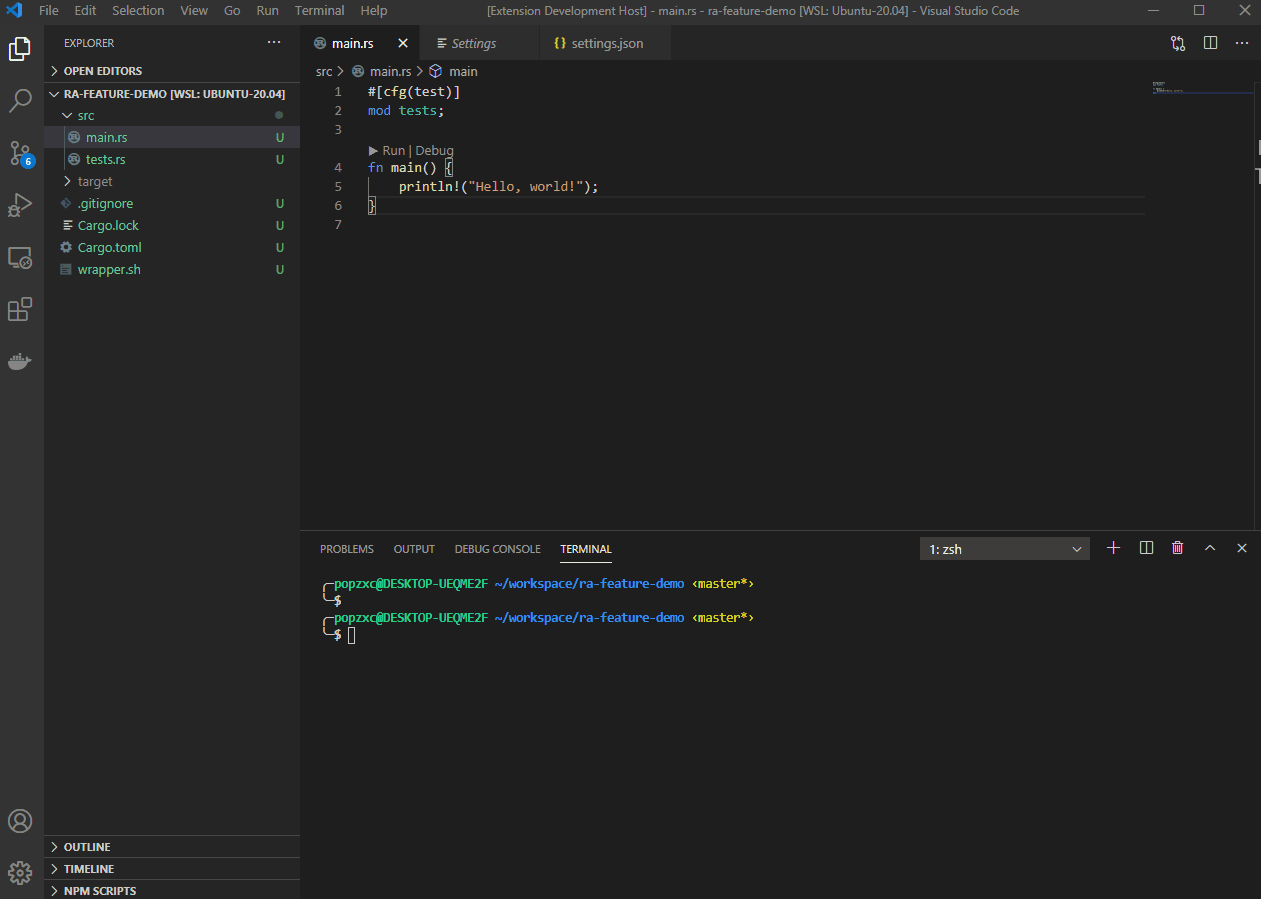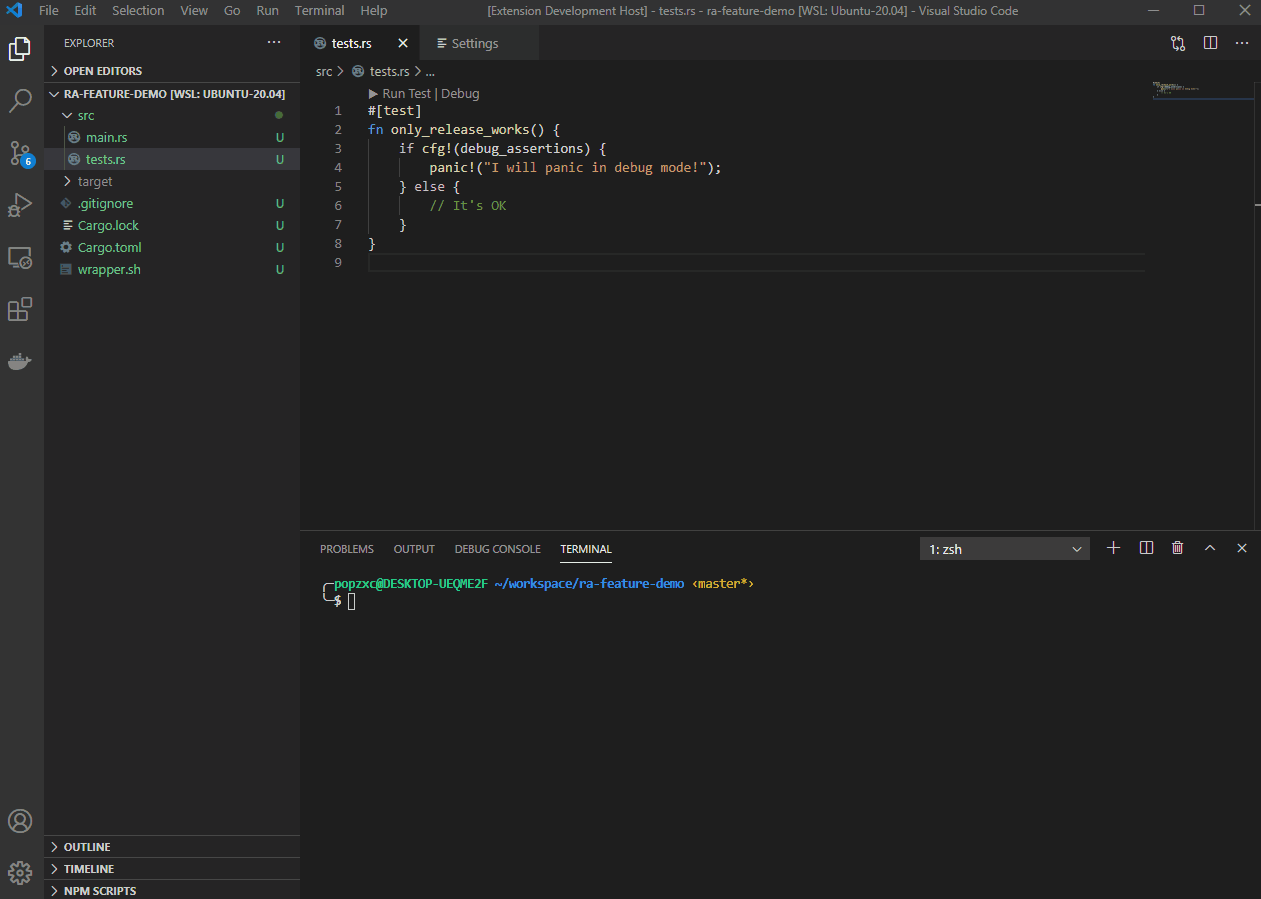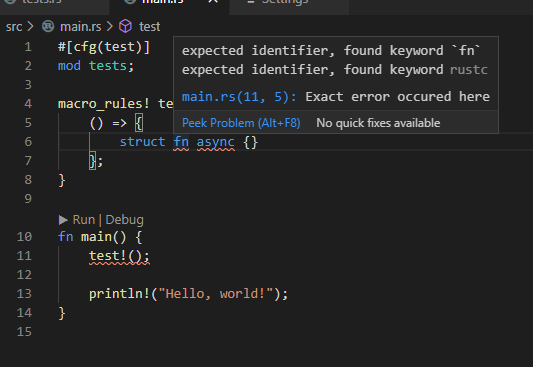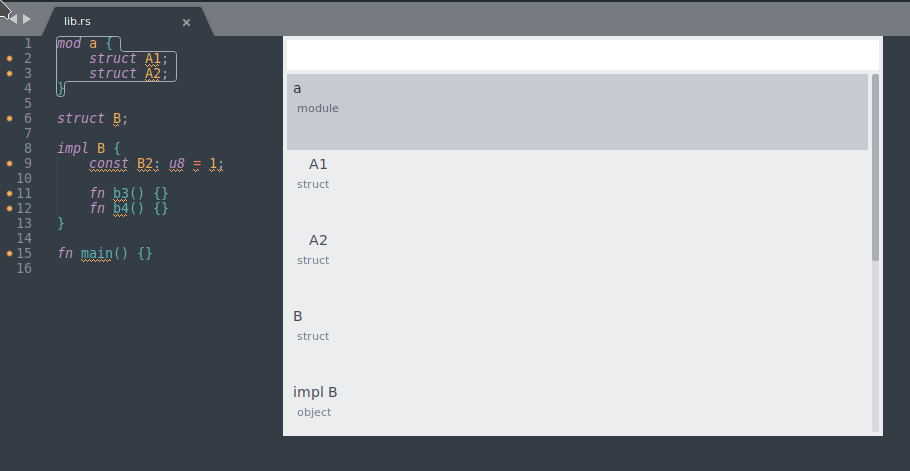5954: Add flexible configuration for runnables r=popzxc a=popzxc
This PR introduces two new configuration options for runnables: `overrideCargo` and `cargoExtraArgs`.
These options are applied to all the "run" tasks of rust analyzer, such as binaries and tests.
Overall motivation is that rust-analyzer provides similar options, for example, for `rustfmt`, but not for runnables.
## `overrideCargo`
This option allows user to replace `cargo` command with something else (well, something that is compatible with the cargo arguments).
Motivation is that some projects may have wrappers around cargo (or even whole alternatives to cargo), which do something related to the project, and only then run `cargo`. With this feature, such users will be able to use lens and run tests directly from the IDE rather than from terminal.

## `cargoExtraArgs`
This option allows user to add any additional arguments for `cargo`, such as `--release`.
It may be useful, for example, if project has big integration tests which take too long in debug mode, or if any other `cargo` flag has to be passed.

Co-authored-by: Igor Aleksanov <popzxc@yandex.ru>
6105: Fix path comparison not comparing paths correctly with unequal lengths r=matklad a=Veykril
~~This PR includes the commit from #6102 there as I found a bug while writing that(so either merging this or both in order works) so I included a test there already which was just ignored.~~ This PR fixes that, basically inserting imports didn't consider path length for equality, so depending on the order it might insert the path before or after another import if they only differ in segment length.
~~Diff without the commit of #61022d90d3937d~~
Co-authored-by: Lukas Wirth <lukastw97@gmail.com>
6019: Remove make::path_from_text r=matklad a=Veykril
This removes the `make::path_from_text` function, which according to a note should've been private. I removed it since it didn't really serve a purpose as it was simply wrapping `make::ast_from_text`.
Co-authored-by: Lukas Wirth <lukastw97@gmail.com>
6033: Make name resolution resolve proc macros instead of relying purely on the build system r=matklad a=jonas-schievink
This makes name resolution look at proc-macro declaration attributes like `#[proc_macro_derive]` and defines the right proc macro in the macro namespace, fixing unresolved custom derives like `thiserror::Error` (which can cause false positives, now that we emit diagnostics for unresolved imports).
This works even when proc-macro support is turned off, in which case we fall back to a dummy expander that always returns an error. IMO this is the right way to handle at least the name resolution part of proc. macros, while the *expansion* itself should rely on the build system to build and provide the macro DLL. It does mean that they may go out of sync, but we can provide diagnostics if that happens (something like "could not find macro X in crate Y – ensure that all files of crate Y are saved").
I think it is valuable to be able to reason about proc macros even when we can't expand them, since proc macro expansion can break between Rust releases or users might not want to turn it on for performance reasons. It allows us to provide better diagnostics on any proc macro invocation we're not expanding (like a weak warning that informs the user that proc macro support is turned off, or that it has been disabled because the server crashed).
Fixes https://github.com/rust-analyzer/rust-analyzer/issues/5763
Co-authored-by: Jonas Schievink <jonas.schievink@ferrous-systems.com>
6085: Mark unresolved imports diagnostic as experimental r=jonas-schievink a=jonas-schievink
It causes a lot of false positives for people. We collected all of the known ones during the last week.
Co-authored-by: Jonas Schievink <jonas.schievink@ferrous-systems.com>
6073: Dont unnecessarily unnest imports r=matklad a=Veykril
Fixes#6071
This has the side effect that paths that refer to items inside of the current module get prefixed with `self`. Changing this behavior is unfortunately not straightforward should it be unwanted, though I don't see a problem with this as prefixing imports like this with `self` is what I do personally anyways 😅. You can see what I mean with this in one of the tests which had to be changed in `crates/ssr/src/tests.rs`.
There is one test that i still have to look at though, ~~which I by accident pushed with `#[ignore]` on it~~, which is `different_crate_renamed`, for some reason this now doesn't use the crate alias. This also makes me believe that aliases in general will break with this. So maybe this is not as straight forwards as I'd hoped for, but I don't really know how aliases work here.
Edit: The failing test should work now
Co-authored-by: Lukas Wirth <lukastw97@gmail.com>
6055: Add ok postfix completion r=matklad a=mullr
Wrapping values in `Ok(...)` is so pervasive that it seems reasonable for it to
have its own postfix completion.
Co-authored-by: Russell Mull <russell.mull@gmail.com>
5846: Add references to fn args during completion r=matklad a=adamrk
When completing a function call, if there is an argument taken as a ref or mut ref which matches the name and type of a variable in scope, we will insert a `&` or `&mut` when filling in the function arguments. This addresses https://github.com/rust-analyzer/rust-analyzer/issues/5449.
E.g.
```rust
fn foo(x: &i32) {}
fn main() {
let x = 5;
foo # completing foo here generates `foo(&x)` now instead of `foo(x)`
}
```
Co-authored-by: adamrk <ark.email@gmail.com>
6043: Allow missing trait members assist without needing braces r=matklad a=M-J-Hooper
Assist to complete missing items when implementing a trait does not appear without impl def braces (see #5144 ).
The reason behind this was that this assist is based on `ast::AssocItemList` which only appears in the AST after the braces are added to the impl def.
Instead of relying on and replacing the item list, we now instead replace the entire `ast::Impl` and add the item list if its missing.
Co-authored-by: Matt Hooper <matthewjhooper94@gmail.com>
6018: Correct project_root path for ProjectJson. r=jonas-schievink a=woody77
It was already the folder containing the rust-project.json file, not the file itself. This also removes the Option-ness of it, since it's now an infallible operation to set the member value.
Co-authored-by: Aaron Wood <aaronwood@google.com>
6036: Don't re-read open files from disk when reloading a workspace r=kjeremy a=lnicola
Fixes#5742Fixes#4263
or so I hope.
Co-authored-by: Laurențiu Nicola <lnicola@dend.ro>
6017: Don't return any TextEdit if formatting is unchanged r=jonas-schievink a=cuviper
I found that `textDocument/formatting` was always returning a full
`TextEdit` replacement, even when there are no changes, which caused Vim
(w/ vim-lsp) to always indicate a modified buffer after formatting. We
can easily compare whether there were changes and return `null` if not,
so the client knows there's nothing to do.
Co-authored-by: Josh Stone <cuviper@gmail.com>
6016: Emit diagnostics for unresolved imports and extern crates r=jonas-schievink a=jonas-schievink
AFAIK, we don't have any major bugs in name resolution that would cause a lot of false positives here (except procedural attribute macro support and some rare issues around `#[path]` on module files), so these are *not* marked as experimental diagnostics right now.
I noticed that diagnostics in a file sometimes don't get displayed after opening, but require some edit to be performed. This seems like a preexisting issue though.
Co-authored-by: Jonas Schievink <jonas.schievink@ferrous-systems.com>
5989: Rewrite import merging r=jonas-schievink a=Veykril
Rewrites how import merging is being handled. It is now a recursive function to properly handle merging of intermediate levels in the import trees. With this ordering the imports is also now possible tho it doesn't quite order it the same way as `rustfmt` does yet, namely it orders lowercase identifiers after uppercase identifiers as that is the standard character order that rust uses. This also fixes a few weird behaviors that were visible in some of the `replace_qualified_name_with_use.rs` tests.
This really took longer than I was hoping for, fighting with import trees is quite the exhausting task 😅
Co-authored-by: Lukas Wirth <lukastw97@gmail.com>
6013: Add support for custom flycheck commands with JSON project workspaces r=jonas-schievink a=woody77
Enable flychecks with JSON project workspaces if an override command was provided as part
of the client configuration:
```
"rust-analyzer.checkOnSave.enable": true,
"rust-analyzer.checkOnSave.overrideCommand": ["custom_tool", "arg1", "arg2"],
```
Co-authored-by: Aaron Wood <aaronwood@google.com>
I found that `textDocument/formatting` was always returning a full
`TextEdit` replacement, even when there are no changes, which caused Vim
(w/ vim-lsp) to always indicate a modified buffer after formatting. We
can easily compare whether there were changes and return `null` if not,
so the client knows there's nothing to do.
5976: Complete trait impl immediately after type/const/fn r=jonas-schievink a=oxalica
Currently, we can complete type/const/fn but only if we typed an identifier.
That is, `impl .. { fn f<|> }` has completions with all trait fn including `f`, but `impl .. { fn <|> }` doesn't provide any suggestion (even if explicit trigger it).
This PR tweak the logic of completion match to make it possible.
However, we still need to explicit trigger suggestions (`Control + Space` by default) in vscode to show. Not sure if we can make it automatically triggered after typing the space after `fn`.
Another question is that I cannot figure out why `BLOCK_EXPR` need to be checked. A block expr directly inside a impl block should be invalid, and nested items will failed to locate impl block in specific offset and skip the suggestion. Now I simply removed it and no tests are broken.
4f91478e50/crates/ide/src/completion/complete_trait_impl.rs (L109)
Co-authored-by: oxalica <oxalicc@pm.me>
5985: Make MergeBehaviour configurable r=jonas-schievink a=Veykril
This should make the newly implemented `MergeBehaviour` for import insertion configurable as roughly outlined in https://github.com/rust-analyzer/rust-analyzer/pull/5935#issuecomment-685834257. For the config name and the like I just picked what came to mind so that might be up for bikeshedding.
Co-authored-by: Lukas Wirth <lukastw97@gmail.com>
5971: Implement async blocks r=flodiebold a=oxalica
Fix#4018
@flodiebold already gave a generic guide in the issue. Here's some concern about implementation detail:
- Chalk doesn't support generator type yet.
- Adding generator type as a brand new type (ctor) can be complex and need to *re-introduced* builtin impls. (Like how we implement closures before native closure support of chalk, which is already removed in #5401 )
- The output type of async block should be known after type inference of the whole body.
- We cannot directly get the type from source like return-positon-impl-trait. But we still need to provide trait bounds when chalk asking for `opaque_ty_data`.
- During the inference, the output type of async block can be temporary unknown and participate the later inference.
`let a = async { None }; let _: i32 = a.await.unwrap();`
So in this PR, the type of async blocks is inferred as an opaque type parameterized by the `Future::Output` type it should be, like what we do with closure type.
And it really works now.
Well, I still have some questions:
- The bounds `AsyncBlockImplType<T>: Future<Output = T>` is currently generated in `opaque_ty_data`. I'm not sure if we should put this code here.
- Type of async block is now rendered as `impl Future<Output = OutputType>`. Do we need to special display to hint that it's a async block? Note that closure type has its special format, instead of `impl Fn(..) -> ..` or function type.
Co-authored-by: oxalica <oxalicc@pm.me>
5955: Remove merge import code duplication r=jonas-schievink a=Veykril
This removes the code duplication caused by #5935, this also allows the assist to merge imports that have equal visibility and prevents merges of unequal visibility. This PR also fixes an iteration mistake in the mentioned PR:
Turns out I made a mistake when writing the `segment_iter` function, I was assuming that the `children` of a path will just be the segments, which is obviously not the case. This also brings insertion order of shorter paths in line with how `rustfmt` orders them.
Co-authored-by: Lukas Wirth <lukastw97@gmail.com>
5951: Rename record_field_pat to record_pat_field r=jonas-schievink a=pksunkara
The token was renamed but not this.
5975: Report better errors in project.json/sysroot r=jonas-schievink a=jonas-schievink
This does a bunch of light refactoring so that the `Sysroot` is loaded later, which makes sure that any errors are reported to the user. I then added a check that reports an error if libcore is missing in the loaded sysroot. Since a sysroot without libcore is very useless, this indicates a configuration error.
Co-authored-by: Pavan Kumar Sunkara <pavan.sss1991@gmail.com>
Co-authored-by: Jonas Schievink <jonas.schievink@ferrous-systems.com>
5957: Add consuming modifier to lvalues that are passed by value and not Copy r=jonas-schievink a=Nashenas88
Related to #5856
Co-authored-by: Paul Daniel Faria <Nashenas88@users.noreply.github.com>
5956: Highlight errors in macros r=jonas-schievink a=popzxc
Resolves#4924
This PR makes rust-analyzer highlight not only the source place when error originates in macro, but also the exact places in macro which caused an error.
This is done by creating an inverse diagnostic, which points to the macro and cross-references the source place.

Co-authored-by: Igor Aleksanov <popzxc@yandex.ru>
5968: Lookup ADT and associated type names for chalk debugging / tweak chalk interner r=flodiebold a=nathanwhit
This PR improves the chalk program writing integration by looking up the names for ADTs and associated types, making the output much more readable.
There are also a few small changes to the interner, which gives some nice performance improvements. We clone `Ty`s and `ProgramClause`s relatively often in chalk, so wrapping them in `Arc`s is a perf win. This takes the time for performing type inference on the rust-analyzer codebase from 40s to 33s on my machine.
Co-authored-by: Nathan Whitaker <nathan.whitaker01@gmail.com>
5940: Implement "Replace `impl Trait` function argument with the named generic" assist. r=matklad a=alekseysidorov
Fixes#5085
Co-authored-by: Aleksei Sidorov <gorthauer87@yandex.ru>
5935: Rewrite import insertion r=matklad a=Veykril
This is my attempt at refactoring the import insertion #3947. I hope what I created here is somewhat in line with what was requested, it wouldn't surprise me .
`common_prefix` is a copy from `merge_imports.rs` so those should be unified somewhere, `try_merge_trees` is also copied from there but slighly modified to take the `MergeBehaviour` enum into account.
`MergeBehaviour` should in the end become a configuration option, and the order if `ImportGroup` probably as well?
I'm not too familiar with the assist stuff and the like which is why I dont know what i have to do with `insert_use_statement` and `find_insert_use_container` for now.
I will most likely add more test cases in the end as well as I currently only tried to hit every path in `find_insert_position`.
Some of the merge tests also fail atm due to them not sorting what they insert. There is also this test case I'm not sure if we want to support it. I would assume we want to? https://github.com/rust-analyzer/rust-analyzer/pull/5935/files#diff-6923916dd8bdd2f1ab4b984adacd265fR540-R547
The entire module was rewritten so looking at the the file itself is probably better than looking at the diff.
Regarding the sub issues of #3947:
- #3301: This is fixed with the rewrite, what this implementation does is that it scans through the first occurence of groupings and picks the appropriate one out. This means the user can actually rearrange the groupings on a per file basis to their liking. If a group isnt being found it is inserted according to the `ImportGroup` variant order(Would be nice if this was configurable I imagine).
- #3831: This should be fixed with the introduced `MergeBehaviour` enum and it's `Last` variant.
- #3946: This should also be [fixed](https://github.com/rust-analyzer/rust-analyzer/pull/5935/files#diff-6923916dd8bdd2f1ab4b984adacd265fR87)
- #5795: This is fixed in the sense that the grouping search picks the first group that is of the same kind as the import that is being added. So if there is a random import in the middle of the program it should only be considered if there is no group of the same kind in the file already present.
- the last point in the list I havent checked yet, tho I got the feeling that it's not gonna be too simple as that will require knowledge of whether in this example `ast` is a crate or the module that is already imported.
Co-authored-by: Lukas Wirth <lukastw97@gmail.com>
`hir` should know nothing about URLs, markdown and html. It should
only be able to:
* resolve stringy path from documentation
* generate canonical stringy path for a def
In contrast, link rewriting should not care about semantics of paths
and names resolution, and should be concern only with text mangling
bits.
5893: Allow running a test as a binary r=matklad a=jonas-schievink
If a test uses `harness = false`, it just contains an `fn main` that is executed via `cargo test`. This adds support for that.
Note though that Cargo doesn't actually tell us whether `harness = false`, so this hint will always show up when you put an `fn main` into an integration test. Normally people shouldn't be doing that if they do use the harness though.
Co-authored-by: Jonas Schievink <jonas.schievink@ferrous-systems.com>
Overlapping indels are a bug. Checking this *always* is tricky (needs
a sorted data structure to not suffer O(N^2) perf). But
opportunistically checking small indels should give provide 80% of the
benefits.
4873: Resolve links in hover documentation r=matklad a=zacps
This PR resolves links in hover documentation. Both the upcoming intra-doc-links style and the old "path-based" style.
## Todo
* [x] More tests
* [ ] Benchmark (Is there an easy way to benchmark this?)
* [x] ~~Resolve issues with the markdown parser/get rid of it~~ Migrate to `pulldown_cmark_to_cmark`
* [x] Reorganise code (Tips appreciated)
---
Fixes#503
Co-authored-by: Zac Pullar-Strecker <zacmps@gmail.com>
4776: Do a weekly minor publish to crates.io r=matklad a=pksunkara
This is the same system I set up on Chalk repo.
Every week it creates a new minor version, pushes it to github and then deploys it to crates.io.
Co-authored-by: Pavan Kumar Sunkara <pavan.sss1991@gmail.com>
5845: Omit lenses for not runnable doctests r=matklad a=SomeoneToIgnore
Ideally, we should properly parse the doctest attributes before, but since I need it for the code lens only, this way should suffice for now
Co-authored-by: Kirill Bulatov <mail4score@gmail.com>
We might want to provide more efficient impls for check if usages
exist, limiting the search, filtering and cancellation, so let's
violate YAGNI a bit here.
Main one: instead of adding a parameter to function to handle special
case, make the caller handle it.
Second main one: make sure that function does a reasonable thing.
`highlight_def` picks a color for def, *regardless* of the context
the def is use. Feeding an info from the call-site muddies the
responsibilities here.
Minor smells, flagging the function as having space for improvement in
the first place:
* many parameters, some of which are set as constants on most
call-sites (introduce severalfunction instad)
* boolean param (add two functions instead)
5643: Add new consuming modifier, apply consuming and mutable to methods r=matklad a=Nashenas88
This adds a new `consuming` semantic modifier for syntax highlighters.
This also emits `mutable` and `consuming` in two cases:
- When a method takes `&mut self`, then it now has `function.mutable` emitted.
- When a method takes `self`, and the type of `Self` is not `Copy`, then `function.consuming` is emitted.
CC @flodiebold
Co-authored-by: Paul Daniel Faria <Nashenas88@users.noreply.github.com>
5695: Added completion for unstable features r=matklad a=Fihtangolz
Added xtask for downloading list of unstable features from the unstable book and codegen for it. Also included small changes from linter.
Co-authored-by: Dmitry <mamhigtt@gmail.com>
Co-authored-by: Dmitry Opokin <mamhigtt@gmail.com>
5682: Add an option to disable diagnostics r=matklad a=popzxc
As far as I know, currently it's not possible to disable a selected type of diagnostics provided by `rust-analyzer`.
This causes an inconvenient situation with a false-positive warnings: you either have to disable all the diagnostics, or you have to ignore these warnings.
There are some open issues related to this problem, e.g.: https://github.com/rust-analyzer/rust-analyzer/issues/5412, https://github.com/rust-analyzer/rust-analyzer/issues/5502
This PR attempts to make it possible to selectively disable some diagnostics on per-project basis.
Co-authored-by: Igor Aleksanov <popzxc@yandex.ru>
5687: Fix document symbols order r=matklad a=magurotuna
Resolves#5655
And adds tests for `handle_document_symbol`, both with `hierarchical_symbols` enabled and with it disabled.
Previously document symbols were displayed in reverse order in sublime text with its LSP plugin, but this patch fixes it like this:

Co-authored-by: Yusuke Tanaka <yusuktan@maguro.dev>
5758: SSR: Explicitly autoderef and ref placeholders as needed r=matklad a=davidlattimore
Structural search replace now inserts *, & and &mut in the replacement to match any auto[de]ref in the matched code.
e.g. `$a.foo() ==>> bar($a)` might convert `x.foo()` to `bar(&mut x)`
Co-authored-by: David Lattimore <dml@google.com>
The idea here is that, on CI, we only want to cache crates.io
dependencies, and not local crates. This keeps the size of the cache
low, and also improves performance, as network and moving files on
disk (on Windows) can be slow.